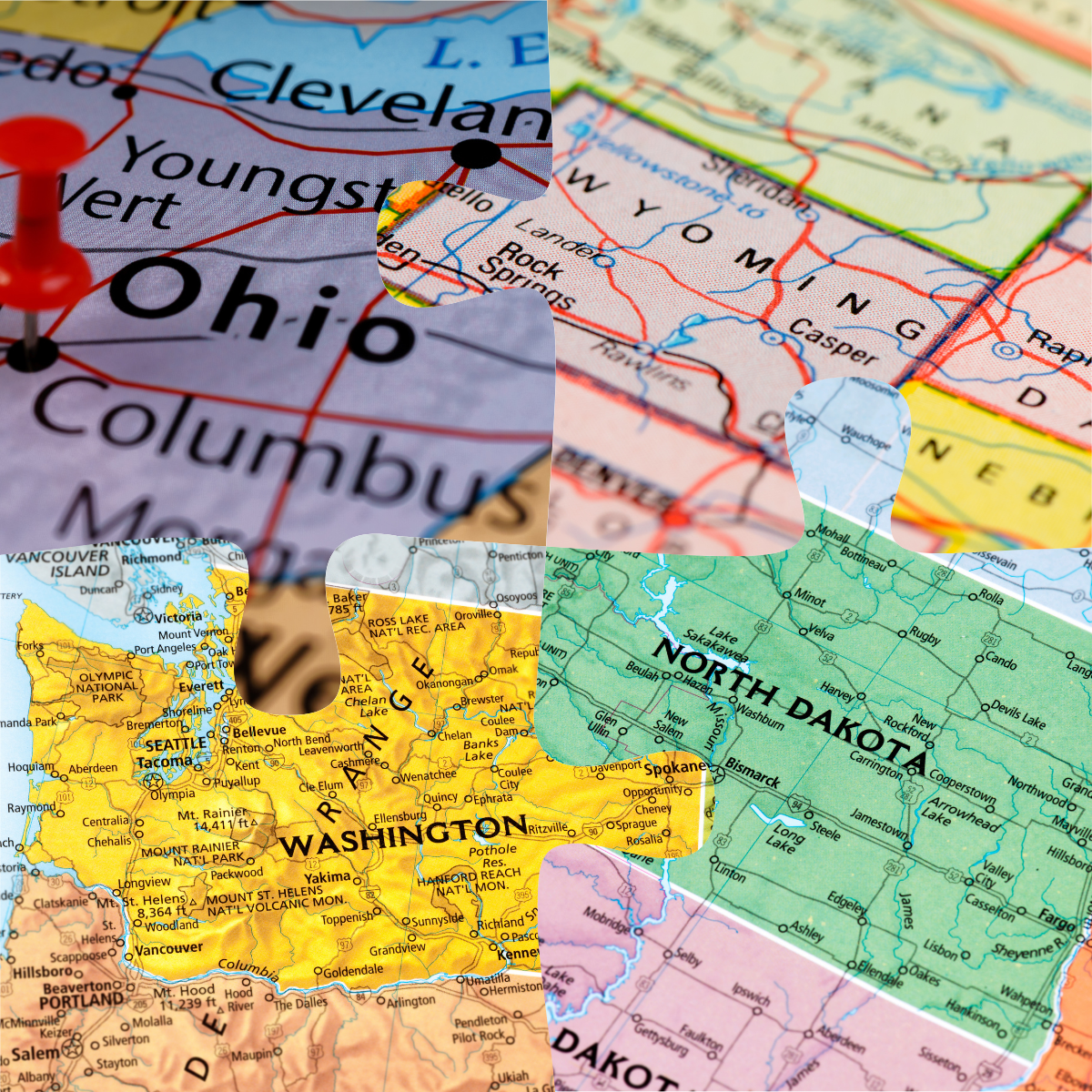In the intricate world of workers' compensation, some states operate under a monopolistic system, creating a unique set of regulations and challenges for insurance retailers. This comprehensive guide aims to provide insights into navigating the complexities of workers' comp in monopolistic states.

Understanding Monopolistic States:
Monopolistic states are those where the workers' compensation system is managed exclusively by a state-run fund. The decision for a state to adopt a monopolistic system is often influenced by historical, economic, or political factors.
Monopolistic Workers Comp States
Several states in the U.S. operate under a monopolistic workers' comp system. They are:
- Ohio
- North Dakota
- Wyoming
- Washington
Insurance retailers need to grasp the unique dynamics of each state to effectively navigate their workers' comp offerings.
Workers' Comp in Ohio
Ohio's workers' comp system is overseen by the Ohio Bureau of Workers' Compensation (BWC). Key considerations include state-specific regulations, reporting procedures, and recent legislative changes. Understanding and navigating these aspects is crucial for insurance retailers to offer comprehensive coverage to clients in Ohio.
Workers' Comp in North Dakota
North Dakota's workers' comp system follows a monopolistic model as well. To obtain coverage in North Dakota an employer would contact North Dakota Workforce Safety & insurance. Insurance retailers need to consider mandatory coverage requirements, recent legislative changes, and reporting obligations. Grasping these specifics enables insurance retailers to provide tailored workers' comp solutions to their clients in North Dakota.
Workers' Comp in Wyoming
Wyoming's workers' comp landscape is distinctive and overseen by Wyoming Department of Workforce Services. Insurance retailers should be well-versed in state-specific regulations, reporting obligations, and considerations when tailoring insurance packages. A comprehensive understanding allows retailers to offer effective coverage solutions to clients in Wyoming.
Workers' Comp in Washington
Washington state operates its own workers' comp system thru Washington State Department of Labor and Industries. Insurance retailers need to explore state-specific regulations, reporting procedures, and potential challenges. Enhanced knowledge in these areas empowers retailers to provide tailored coverage solutions to clients in Washington.
Supplementary Coverage in Monopolistic States
Employers' liability insurance and stop gap coverage act as supplements to the limited coverage provided by monopolistic state-run workers' compensation programs. They offer employers a broader scope of protection, encompassing legal liabilities and occupational diseases, and are particularly crucial for businesses operating in multiple states or industries with specific risk exposures not fully addressed by the state-run programs. Insurance retailers should guide their clients on the importance of these coverages to ensure comprehensive risk management.

Employers' Liability Insurance:
- Coverage Beyond Workers' Comp: Monopolistic state-run workers' compensation programs often cover only statutory benefits. Employers' liability insurance extends coverage beyond these statutory limits, providing protection for employers against lawsuits filed by employees for workplace injuries or illnesses.
- Legal Defense: Employers' liability insurance typically includes coverage for legal defense costs. In the event of a lawsuit, this coverage helps with legal fees, court costs, and settlements, offering financial protection to the employer.
Stop Gap Coverage:
- Monopolistic states workers' compensation policies usually exclude Employers' Liability coverage. For employers that want to add Employers' Liability to their monopolistic state policies, they can purchase stop gap coverage. This is usually an endorsement added to the insured's general liability policy, or if the insured has a traditional workers' comp policy, stop gap can be added to this policy as well.
Monopolistic vs. Competitive Funds
Monopolistic Workers' Comp Funds
In states with monopolistic workers' compensation funds, the system is marked by its simplicity and uniformity. Here, a single, state-run fund oversees the entire workers' compensation process, eliminating the need for employers to navigate different insurance providers. Rates are consistent across industries and employers, providing a predictable cost structure. This centralized approach allows the state to exert greater control over the workers' compensation system, enabling direct oversight and potential regulatory adjustments.
However, this simplicity comes at the cost of limited choices for employers, who cannot shop for policies from various carriers, potentially restricting their flexibility. Moreover, the absence of competition among insurance providers in monopolistic states may lead to fewer incentives for efficiency and innovation in the system.
Competitive Workers' Comp Funds
Conversely, in states with competitive workers' compensation funds, the landscape is characterized by market competition. Multiple insurance providers are allowed to offer workers' compensation coverage, fostering a variety of options and pricing structures. Employers in competitive states benefit from the flexibility to choose from different insurance carriers, enabling them to tailor coverage to their specific needs.
This diversity in choices, however, may introduce complexity for employers, particularly those unfamiliar with the intricacies of insurance. Additionally, the potential for rate variability among different providers can make it challenging for employers to predict and manage their workers' compensation costs effectively.
The trade-off lies between the simplicity and consistency of monopolistic funds and the flexibility, albeit with added complexity, of competitive funds. Insurance retailers play a crucial role in guiding clients based on their unique circumstances and risk management preferences.
How Are Workers' Compensation Rates and Classifications Determined in Monopolistic States?
In monopolistic states, workers' compensation insurance is managed through state-run funds, and rates and experience rating factors are determined by each state's rating bureau. Unlike non-monopolistic states, which may rely on national organizations like the National Council on Compensation Insurance (NCCI) for classification codes and ratings, monopolistic states have their own experience rating bureaus and state-specific methods for determining rates.
Here are the monopolistic states and their respective experience rating bureaus:
- Ohio: Ohio Bureau of Workers' Compensation (BWC)
Washington: Washington State Department of Labor & Industries (L&I)
North Dakota: North Dakota Workforce Safety & Insurance (WSI)
Wyoming: Wyoming Department of Workforce Services (DWS)
Each of these agencies manages the workers' compensation system in its state, including the classification of industries, experience rating systems, and claims processing.
In monopolistic states, experience modifiers and other risk factors specific to employers influence the rates. These rating bureaus aim to promote safer work environments and efficient return-to-work programs by incentivizing employers to manage claims effectively and reduce workplace injuries.
Conclusion
Navigating the complexities of workers' comp in monopolistic states demands a distinct understanding of state-specific regulations, coverage nuances, and strategic considerations. As insurance retailers delve into the unique landscapes of Ohio, North Dakota, Wyoming, and Washington, they equip themselves to offer tailored and effective coverage solutions to their clients.
High-Risk Workers’ Comp with Novatae
For clients operating in states allowing private workers' compensation, our specialized assistance in high-risk workers' compensation insurance stands out. Our seasoned underwriters excel at providing coverage tailored for unique challenges, including new ventures, demanding industry classes, multi-state exposures, and high experience mods.
We specifically focus on states permitting private workers' comp arrangements, offering expertise in standalone coverage for staffing firms, alternative workers' compensation, and high-risk accounts. Whether clients are in high-mod, have lapsed accounts, or are venturing into new territories, we navigate the complexities of workers' compensation, ensuring comprehensive protection. With strong connections to A to A++XV AM Best-rated carriers, our success lies in securing quality coverage for large and intricate transactions. For those in states allowing private workers' comp, our dedicated insurance agents are ready to provide quick quotes and address inquiries about high-risk workers' compensation insurance.
This article is not intended to be exhaustive, nor should any discussion or opinions be construed as legal advice. Readers should contact legal counsel or an insurance professional for appropriate advice.
About the Author
Insights
- What is an Umbrella Insurance Policy?
- What is Animal Mortality Insurance?
- MFA: The Cyber Version of a "Highly Protected Risk"
- Convenience Store Insurance Programs: What You Need to Know
- Home Health Liability Insurance: What You Should Know
- Commercial Builders' Insurance: Comprehensive Protection for Construction Professionals
- Understanding the Role of Additional Insureds in Commercial Insurance
- Convenience Store & Gas Station Insurance Coverage Explained
- The Convergence of Cybersecurity and Cyber Insurance
- It’s Easy to Become a Criminal Hacker!
- Medical Spa Insurance: What Insurance Retailers Need to Know
- Contractors Professional Liability Insurance
- Action Over Coverage and Exclusions



.png)
.png)